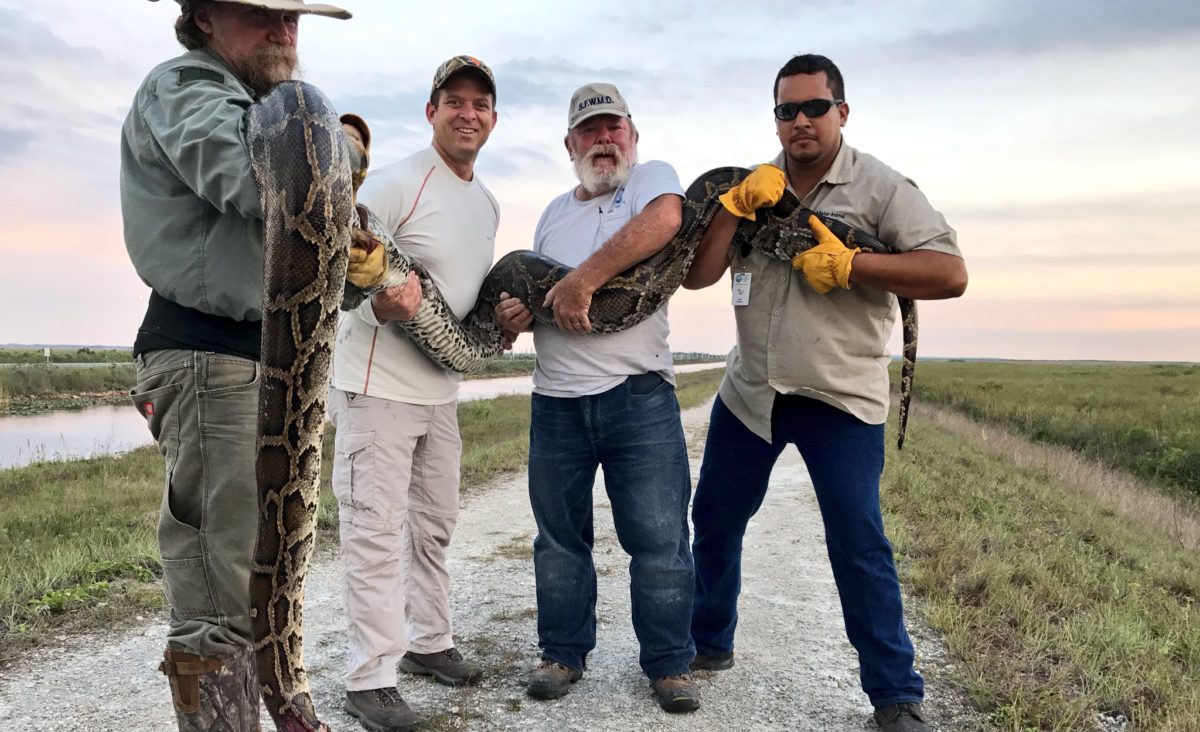Florida Legislature Debating Using Drones to Hunt Down Pythons in Everglades

Carlos Lopez-Cantera / Twitter.
The Burmese python has plagued the Florida Everglades for years, and the state’s Legislature is considering using a new strategy to hunt them down: drones.
These giant non-native snakes have an average length of over 12 feet, have been known to grow in the wild to over 18 feet, and they have a huge appetite to match. They first became a problem for Florida when people who had purchased them as pets and no longer wished to care for them released them into the wild.
In 1992, Hurricane Andrew wiped out a python-breeding facility and zoo, resulting in a massive escape of the snakes held there.
In the swamps of the Everglades and connecting warm waters throughout South Florida, the pythons found a hospitable environment, plentiful prey, and few competitive predators.
Scientific surveys of Everglades wildlife would report a devastating drop in the populations of many species. One report in 2012 described how in areas where the pythons were “well established,” foxes and rabbits had “disappeared,” and sightings of raccoons were down by 99.3 percent, possums by 98.9 percent, and white-tailed deer by 94.1 percent.
The pythons also harm native predators, like the endangered Florida panther, by depleting their food supply. They are even known to battle Florida alligators, in what is at least somewhat of a fair fight, with the gators sometimes coming out the victor and sometimes becoming snake food, as seen in the below video.
Florida authorities have employed a variety of strategies over the years to battle the pythons, including offering generous cash prizes for anyone willing to hunt the big snakes. The original 2017 program offered “a minimum wage hourly rate up to 10 hours daily” for time spent hunting snakes, bounties of $50 for a 4-foot python plus $25 for each additional foot of length, and a bonus of an additional $200 for a python guarding a nest of eggs.
Tracking down the pythons through the hundreds of square miles of Everglades swamps is still a challenge, and that is where drones could provide help.
Current Florida law restricts the use of drones by law enforcement agencies to gather evidence or other information, a statute that was passed in response to privacy concerns that this developing technology would be abused by police to conduct warrantless searches of Floridians’ property. This bill would carve out an exception for the Florida Fish and Wildlife Conservation Commission and the Florida Forest Service to use drones for tasks like “managing and eradicating invasive exotic plants and animals.”
Florida Sen. Ben Albritton, a supporter of the bill, told the AP that he had flown over Everglades National Park in a helicopter, and saw firsthand how drones could be used to track down the pythons and troublesome plants like the lygodium, a fern native to Asia that was choking out native flora, as well as help manage and respond to wildfires.
Of course, once drones identify pythons, someone still has to go hunt them down and kill them. One Floridian who has experienced this firsthand is former Lt. Gov. Carlos Lopez-Cantera, who made headlines in 2017 when he accompanied other registered python hunters and killed a 15-foot python with a pocketknife.
Reached by phone Wednesday evening, Lopez-Cantera recalled what he’d learned about the pythons’ rapid growth and insatiable appetites. “They grow six feet in their first year, and everyone else is on the menu,” including the alligators that they battle for supremacy. “I think it’s a great idea,” he said, calling it “an innovative approach to tackling this serious problem.”
New: The Mediaite One-Sheet "Newsletter of Newsletters"
Your daily summary and analysis of what the many, many media newsletters are saying and reporting. Subscribe now!






Comments
↓ Scroll down for comments ↓